#maude standish
Text
I think a lot of the relationship conflict between Ezra and Maude can be attributed to the fact that Maude divides the world into marks and not-marks, and when she came to town the first time she made the very easy mistake of drawing the line in a different place from Ezra.
10 notes
·
View notes
Text
Good morning, I've been inducted into the fandom that is Magnificent Seven. Please be aware that I have ZERO chill about it.
With this out of the way, lemme introduce you to the Flashpoint/Magnificent Seven crossover idea.
~~~
- Team Seven consists of Sergeant Chris Larabee, Team Leader Vin Tanner, Explosives Expert Buck Wilmington, Lead Negotiator Josiah Sanchez, Combat Medic Nathan Jackson, Tech Wiz JD Dunne, and Undercover Agent Ezra Standish
- Chris and Buck grew up (ish) together, met in their teens and grew apart after highschool. They came back together after Buck was assigned to Team Seven shortly after joining the SRU
- Josiah and Nathan are not old friends, but close ones, bonded by rolling their eyes at the stupid things the young'ins do and say
- JD is the youngest SRU member to date, but he's no less qualified or deadly that the other fine men and women. He and Buck are roommates, Buck rarely lets him out of his sight
- Ezra is the last to join Team Seven. His joining was actually requested by Vin
- Vin and Ezra met during training and have been ride or die best friends ever since. Mess with one at your own risk
- Josiah is the team father, but can and will create chaos if he feels it's been too quiet
- Team Seven meets in the backroom of some bar once or twice a week or whenever there's a hard case that hits too close to home
- Ezra is a legacy cop
- Chris's family was killed in a fire, but they caught the guy who did it. He's still trying to connect the guy to this woman who was obsessed with him, but so far he's had no luck
- Vin and Ezra are referred to as the Chaos Gremlins by Teams One, Two, Four, Six, and Seven as well as most of the upper brass
- Travis's job is legitimately to reign in Team Seven. That's it. He's just there to make sure the boys don't go off the rails
- There is a list of things Team Seven isn't allowed to do but this list is largely ignored by everyone except Nathan
- Team Three is virtually shunned by Team One and Team Seven for what they did while Ezra worked with them
- Ezra is VERY good at undercover, though that's rarely needed in the SRU. He is also quite skilled at negotiation
- Ezra and Vin started a club for kids of bad upbringing due to any number of circumstances. Sam Braddock is also part of this club and Spike Scarlatti is an honorary member
- Team Seven and Team One are close and work together very well
- The "Magnificent Seven" as Team Seven is called have a reputation amongst the SRU, not the least of which includes their legendary games of Hide and Seek with training ammunition
- Team Seven is highly uneasy around Maude Standish
- Ezra's Derringer rigging was approved for use while he was in training, but it took months for the approval to get through
- Ezra's past is person and Vin is the only one he'll talk to plainly about it
- Team Seven is considered the second best team in the SRU, only outranked by Team One by three points
~~~
Thank you!
#the magnificent seven#the magnificent seven 1998#the magnificent seven series#chris larabee#vin tanner#buck wilmington#jd dunne#nathan jackson#josiah sanchez#ezra standish#flashpoint#strategic response unit#sru#mag7#alternate universe#mad rambles#mad makes
6 notes
·
View notes
Text
Chris: I created a perfect lawman.
Maude: You ruined a perfectly good conman, is what you did. Look at him. He's got friends now.
#submission#the magnificent seven#the magnificent seven 1998#chris larabee#maude standish#mag7#incorrect quotes
49 notes
·
View notes
Text
Maude drives me crazy how dare she just burst in on her sons life and make him feel bad, that for the first time he has a home and friends and no he isn’t running a con but he’s still happy
21 notes
·
View notes
Text
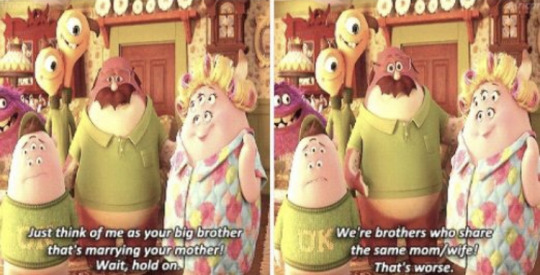
Josiah to Ezra anytime Maude shows up
#m7#mag7#magnificent seven#magnificent 7#the magnificent seven#ezra standish#anthony starke#josiah sanchez#ron perlman#maude standish
8 notes
·
View notes
Text
Magnificent 7 Head-canons I Think Too Much About #4
Ezra’s father is Big Lester Banks—not that either man is aware of this information. If Maude was feeling unusually sentimental and emotional, she would dub Lester as her “favorite mistake”. He is not one of her former husbands but, rather, a former business partner. They had a very good time together but Maude worried that she was getting rather….too fond of Lester and he likewise. He even suggested several times that they marry—normally after a bit too much whiskey. This rather alarmed Maude.
When she became pregnant, she disappeared. Lester wrote and telegrammed her several times but finally gave up when she never replied. Maude suspected that he had just enough nobility in him to do something foolish…like become serious about his marriage proposals.
Sometimes it amazes Maude how much her son takes after his father. Ezra’s similar personality, similar outlook, and slight streak of heroism that leads him to do rash things surprises her in unguarded moments. She has always prided herself on how much of a Standish Ezra is…but sometimes she has to remember that he is a Banks too.
21 notes
·
View notes
Text
Smoking and other Hobbies
-Click here to return to the index for Stranger Missions-
(This post includes photos of all cigarette cards but not locations)
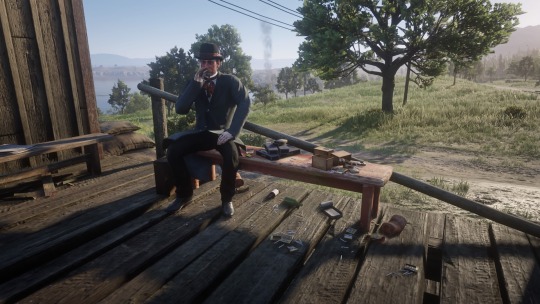
Cards are listed and displayed in order from left to right, top to bottom. (ie. 1,2,3,4 not 1,5,7,10)
Amazing Inventions Card Set:
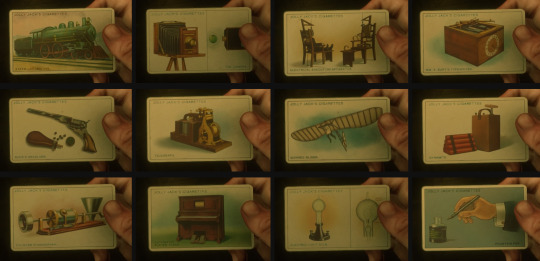
Steam Locomotive 1814 - George Stephenson
Camera 1814 - Joseph Nicephore Niepce
Electrical Execution Apparatus 1888 - H.P. Brown A. Kennelly
Typewriter 1829 - W.A. Burt
Revolver 1836 - Daniel Buck
Telegraph 1837 - Samuel Morse
Manned Glider 1893 - Charles Kinnear
Dynamite 1866 - Alfred Nobel
Cylinder Phonograph 1877 - Thomas Edison
Player Piano 1829 - Edward Leveaux
Electric Light Bulb 1876 - Thomas Edison
Fountain Pen 1884 - Lewis Waterman
Artists, Writers, & Poets Card Set:
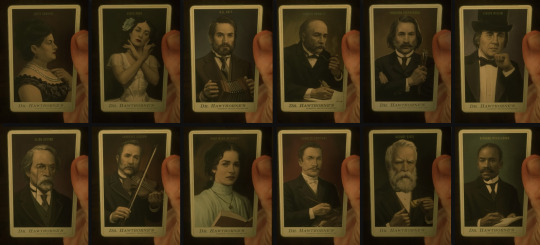
Edith Corinne
Elsie Rose
W.G. Hoyt
Aldous Bramley
Preston T. Stephenson
Evelyn Miller
Slick Hutton
Laurence Carson
Miss Maud Delancey
Charles Châtenay
George Dixie
Richard McCullough
Famous Gunslingers Card Set:
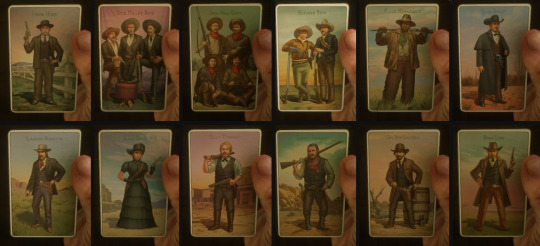
Frank Heck
Otis Miller Boys
Jack Hall Gang
Butcher Brothers
Flaco Hernandez
Slim Grant
Landon Ricketts
Black Belle
Billy Midnight
Emmet Granger
Jim "Boy" Calloway
Bart Love
Fauna of America Card Set:
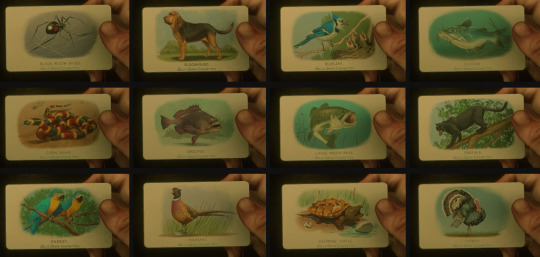
Black Widow Spider
Bloodhound
Bluejay
Catfish
Coral Snake
Grouper
Largemouth Bass
Panther
Parrot
Pheasant
Snapping Turtle
Turkey
Flora of America Card Set:

Golden Current
Hummingbird Sage
Oleander Sage
Yarrow
Indian Tabacco
Black Mangrove
Longleaf Pine
Desert Fan Palm
Coastal Redwood
Horse Crippler Cactus
Blazing Star
Carolina Lupine
Gems of Beauty Card Set:
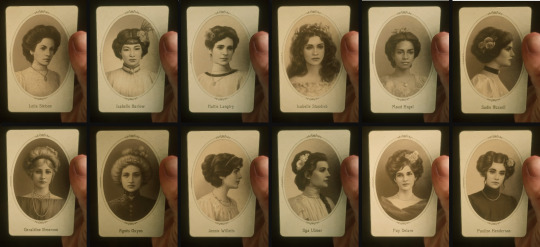
Lelia Stentson
Isabelle Barlow
Hattie Langtry
Isabelle Standish
Maud Engel
Sadie Russell
Geraldine Emerson
Agnes Guyon
Jennie Willetts
Ilga Ulmer
Fay Delaro
Pauline Henderson
Horses Card Set:
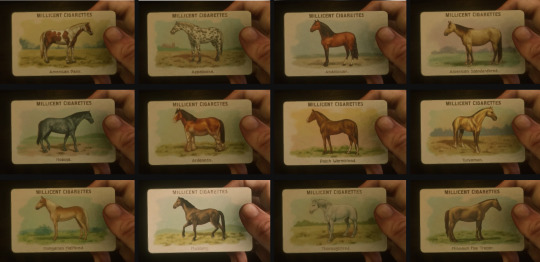
American Paint
Appaloosa
Andalusian
American Standardbred
Nokota
Ardennes
Dutch Warmblood
Turkoman
Hungarian Half-bred
Mustang
Thoroughbred
Missouri Fox Trotter
Marvels of Travel Card Set:

Packet Ship
Schooner
Camel Caravan
Elephant Carriage
Goat Carriage
Hot Air Balloon
U.S. Frigate
The Showboat
Balener Whaling Vessel
Stagecoach
Steam Locomotive
Velocipede
Prominent Americans Card Set:
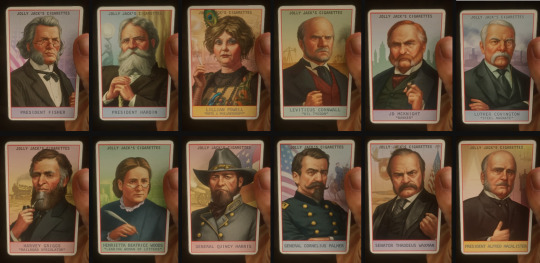
President Fisher
President Hardin
Lillian Powell
Leviticus Cornwall
JD McKnight
Luther Covington
Harvey Griggs
Henrietta Beatrice Woods
General Quincy Harris
General Cornelius Palmer
Senator Thaddeus Waxman
President Alfred MacAlister
Stars of the Stage Card Set:

Laurence Dunn
Louis Durand
Jesse Raymond
Augusta Tremlow
Mabel Potter
Robin Koninsky
Isadore Reid
Irene Grubb
Nettie Palmer
Jim Cobb
Mittie Comstock
Robert Elliot Patchen
Vistas of America Card Set:
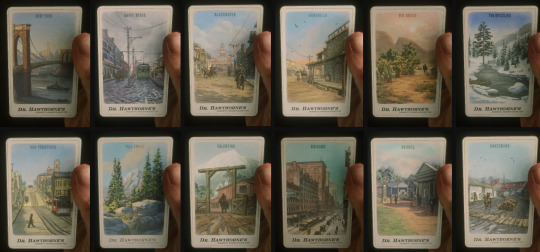
New York
Saint Denis
Blackwater
Armadillo
Rio Bravo
The Grizzlies
San Francisco
Tall Trees
Valentine
Chicago
Rhodes
Annesburg
World Champions Card Set:
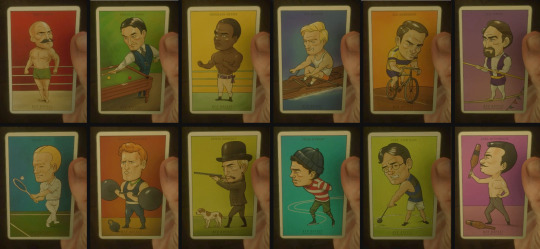
Greco Roman Wrestler - Percy Wood
Billiards - Edwin A. Rowe
Pugilist - Theobaud Getzin
Oarsman - H.T. Slocum
Cyclist - R.S. Harradon
Walker - E.D. Ewing
Lawn Tennis - Patsey Hill
Weightlifter - William Sleicher
Pigeon Shooting - Edwin Singerly
Skater - Felix Hawley
Hammer Thrower - Capt. Jack Page
Swinger - Axel McCormack
9 notes
·
View notes
Text
Nathan: Dignity! You know, it takes a bold man to talk about dignity when he tryin’ to sell women off like they cattle.
Ezra: I’ll ignore that.
Nathan: Yeah, you better do that. How else you gonna get some sleep tonight?
Ezra *flatly*: Anything else?
Nathan: About making profit off the back of another human being? Hell yeah, I got a lot to say, but—It just be wasted on you.
--- Magnificent Seven, Ep 1x03, “Working Girls”
Watching a couple of episodes of Magnificent Seven (1998) again, and I’m remembering why the relationship between these two is probably the single most painful and heart-warming and fascinating on the show. Nathan Jackson and Ezra Standish are one of the most perfect examples of a pair of characters who have either no frame of reference for each other or else a completely wrong one. Or, well, an action-correct but motivation-wrong one. Hence why they keep tearing strips off each other for the whole show, though they soften some later. And this conversation here, very early on, is an excellent illustration as to why.
So the plot of this episode is that the Seven have helped liberate a group of prostitutes from an abusive camp and have to keep them safe over the course of the episode. This involves a lot of people (notably Mary Travis) facing a lot of fairly uncomfortable truths about the darker side of their society and how easy it is to slip up and wind up in a hell. And Ezra is definitely one of those too.
Ezra’s little subplot for the episode is that he decides he’s going to help some of these women win better lives by setting them up in a mail-order bride scheme, run by him, for naturally a small fee. When they react with natural scepticism, wondering how exactly that’s different from being a whore aside from not getting paid for it, he clarifies that he’ll set them up only with wealthy, gentlemanly men, screened by him. Leaving aside their suspicions on this, one of them asks what men like that would want with women like them, and Ezra responds that what the men don’t know won’t hurt them, and he can show them how to act like ‘ladies’. He then spends the rest of the episode trying (with Buck’s help and Josiah’s disdain) to do exactly this via an impromptu ‘charm school’. The above conversation happens when Nathan walks in on the middle of this.
Now. Leaving Nathan’s own background completely aside for a minute, you cannot for one second blame him for coming to this conclusion. Ezra straight-up called it a mail-order bride scam. He is … I mean, he kind of is selling them, he’s just doing so with their cooperation and, in his head, for the purposes of victimising the men, not the women. But he is selling them. He’s getting a cut from arranging marriages for them. That’s only a bit of semantics away from selling them. Add in Nathan’s background as a straight-up slave, and it is plainly obvious and completely understandable why this rubs him savagely the wrong way.
But the thing is, from Ezra’s point of view … the accusation baffles and deeply offends him. Like, really hurts and offends him. You can see it in his face and his stiff, flat tone. If Nathan had slapped him full across the face he could have gotten exactly the same effect. And some of that … Some of that is a lack of self-awareness on Ezra’s part. Some of it is that he’s never looked at things like this from someone like Nathan’s point of view, and there are times when he really, really should.
But it’s also a degree of Nathan missing things. Because in Ezra’s head he genuinely is not selling them. He is not setting them up to be victims. In Ezra’s head he’s setting them up to make their husbands victims. He’s teaching them a con. And, extremely specifically, as we find out later when we meet her, he’s teaching them Maude’s con. He’s teaching them how to act the part of a southern lady and disguise their socially inferior background long enough to string some rich man along and take him for all he’s got.
He’s trying to teach them how to act like his mother, in short. And he’s trying to teach them a lot of what Maude taught him. Failing to realise, maybe, that many of these women are not Maude Standish and may not be able to do what she does serially. Failing to realise that for a lot of women, marriage is exactly as close to slavery as Nathan makes it sound. Failing to realise that he might, in fact, be setting them up as badly as Nathan thinks he is.
I think to a large extent it just didn’t occur to Ezra … I don’t think he’s ever, a day in his life, thought of his mother as a potential victim. In his head, Maude is always the predator. Sure, cons go badly, and marks turn violent, and he probably knows full well that Maude’s probably gotten out of things by the skin of her teeth before, but in his head … that’s just their line of work? If you can’t scam them properly, then you deserve what you get. Nobody’s going to help you, so you better be able to get in and get out by yourself, and with whatever you came for clutched in your fist. I would lay odds that Maude taught him exactly this way himself. Taught him how to playact like his ‘betters’ in order to get close enough to swindle them.
Which probably has some impact on other aspects of his interactions with Nathan. Because the part Maude taught Ezra to play is the part of the Southern Gentleman. And Ezra absorbed a lot of that, with all the incidental horrors it entailed. You act the part, regardless of your true goals or opinions. You act like the people you want to fit in with.
And some of them might even have been Ezra’s own opinions. Their first meeting, when Ezra refuses to ride with the Seven because Nathan’s already there. That could have been genuine racism on Ezra’s part. Casual, not entrenched, because he’s a pragmatic man and he gets over it fairly quick once they start working together and he realises Nathan has his back no matter how much of a dickhead he is. But still. It could easily have been something he absorbed over years of playing this part, and until Nathan challenged it might have been a genuine part of his outlook.
(It could also have been a degree of pragmatism, in that he figured that Nathan as a black man and likely an ex-slave would be the sort to take personal offense to him should dynamics in the group go south, making him potentially a threat with a grudge when Ezra inevitably had to part ways from the goody-two-shoes. So, less conscious racism and more racially-profiled survivalism, but still)
(Or it could have been an excuse, a reason not to ride out suicidally with these morons for bugger-all money, and using racism and his old role as an excuse to get out of it – bit of a risky gambit though, considering he was already neck-deep in trouble as it stood)
The thing we see a lot in their interactions is that Nathan, while he warms up to Ezra slowly and cautiously and recognises him for a genuinely brave and semi-decent man, constantly struggles with two separate images Ezra presents to the world, both of which are triggering for Nathan, and neither of which is actually who Ezra is and wants to be.
The first is the role he learned for cons, the stereotypical Southern Gentleman, which grates on Nathan for obvious reasons and which tends to … the couple of times he’s genuinely flown off the handle at Ezra (here and in S2’s “Chinatown”), it’s been in circumstances where this image is combined with circumstances in which people are (potentially) being sold. Ezra just straight-up triggers everything about Nathan’s past in those circumstances, and he just struggles to see the present not the past. Entirely understandably, for all it hurts Ezra, and for all it isn’t all that true to who Ezra is, a love of erudition and fine furnishings aside.
But the other image Ezra presents, the one that is actually more true to him, at least in terms of upbringing and the frame of reference Ezra himself was raised with, is that of the conman and thief. And that is just as bad to Nathan. Just another means for a white man to take away from honest people, making his living off the backs of other people and not caring about what happens to them in the process. And he … isn’t entirely wrong. On this one, he has a lot of good points. Ezra was raised with a baseline predatory mindset, and he doesn’t always realise it. A lot of things he grew up thinking are perfectly fine and normal … aren’t. Here, Nathan often has, if not the moral high ground, at the very least some pretty good points.
But the thing is … the reason Ezra struggles so much with Maude is that Ezra is also bad at this mindset. It’s the thing he was raised to view as correct, the thing he was raised to aspire to, and he’s just bad at it. As he proved in the pilot when his conscience drove him back. He has some things that he genuinely doesn’t realise are bad, but also others that he knows full well and has to force himself to go through with. And the reason Maude is so against Ezra settling down with these people is that she knows it’s pushing him to make what she views as stupid choices, stupid risks. Things she genuinely thinks will cause him to come to harm (not without reason, although her methods of ‘helping him’ are arguably so much worse). Nathan is causing Ezra to be more honest and honourable, though Nathan doesn’t exactly realise that himself. Mostly because Nathan doesn’t realise what starting position Ezra is coming from in this regard, and admittedly doesn’t have a lot of sympathy for Ezra’s struggle in not being who he was raised to be. Nathan has no frame of reference for Maude, not until he falls afoul of her himself, and that’s not until much later, and she snows him completely for quite a large portion of it.
And on the other end, Ezra just … flat has no frame of reference for Nathan. He has never in his life been made to look at things the way Nathan looks at things. He’s constantly surprised and hurt and offended by how Nathan views his actions. Ezra, for all his bad luck and tendency to wind up in over his head, has never been brutalised the way Nathan has been, and has never realised just how vulnerable other people can be to brutalisation. It doesn’t occur to him that he might be lining up these women to be trapped, or if it does it isn’t something he thinks long on, because he looks at them like he looks at Maude, and Maude is never trapped. If you think you have control of her, it’s because you fell for the scam. But not every woman is Maude.
(And, quite possibly, Maude wasn’t always Maude. She had to start somewhere. Does she worry so much about him becoming an ‘honest’ victim because she’s looking at it from a predator’s point of view, or from ex-prey?)
Ezra looks at people like opponents. It’s the way he was raised. Everyone is out for themselves, and if you can’t take what you need, you’re going to get taken. He doesn’t want to look at them that way. He’s a closet romantic and wants to believe in honour the way the Seven sell it, but there’s always a part of him that cannot fully trust that (also a part of him that prefers the simplicity and comfort of want-take). Everyone you meet could be scamming you. Nobody is ever as innocent or helpless as they appear. The world is full of predators pretending to be prey the better to get close to people. It blinds him to how many ‘prey’ there actually are, and maybe gives him a bit of an opinion that even they partially deserve it? If you can’t get yourself out, maybe you don’t deserve to.
And for Nathan, if you have power and you don’t use it to help people, you’re using it to hurt people. Because that’s what he was raised witnessing. If you have the appearance of power, you have actual power. If you act like a good person, you are one. Actions speak louder than words, the proof is in the pudding. What you do is what matters, not why you do it. Lying, stealing, swindling, is baffling to him, and taking what honest people earn flies too close to what he spent his life enduring, blood, sweat and lives spent entirely for someone else. I think he honestly doesn’t understand why Ezra, who he knows can be an incredibly brave and decent man, doesn’t just commit to that all the time. And sometimes the things Ezra does, often in all innocence or at least a complete lack of understanding, just push him too far.
But they work at it. They get closer to each other. Ezra gradually becomes a more honest and trusting man. Nathan, aside from those times when he’s triggered too strongly to be rational, tries to be a bit gentler with him about it. They develop a respect and friendship for each other. They learn from each other. They make some incredible mistakes when it comes to each other, but they both realise that they’re not actually trying to hurt each other. Or anyone else, mostly, though their definitions of ‘hurt’ tend to vary a bit there. They’re just … easily the most fascinating relationship on the show, if often also one of the most painful.
Anywho. Thus endeth a random trip down memory-lane to an old fandom.
#meta#the magnificent seven#m7 tv#ezra standish#nathan jackson#old fandoms#rewatch thoughts#i like enemies-to-friends#difficult friendships
79 notes
·
View notes
Video
The incomparable Sugar Weasel the Clown was an adult entertainer in Austin Texas for over a decade. Drawing inspiration from B-horror and Sci-fi films, he incorporated elements of male burlesque & erotica into his act gaining notoriety within the underground and fetish communities.
Doing private parties, sex clubs and the occasional rock venue, Sugar Weasel the Clown was raw and unpolished, pushing boundaries and breaking taboos with his performance art.
He unexpectedly obtained worldwide recognition when he gave an Interview to Maude Standish of Vice Magazine back in 2012 and found himself with legions of fans and curiosity seekers almost overnight.
Artist Douglas Wright, the man behind the make-up, created an iconic persona unlike anything anyone had ever seen before but inevitably fell victim to his own notoriety and excess and choose to retire the character in 2017. Wright has since gotten married and moved to the U.K. where he continues to shock audiences with his controversial paintings. Featuring music by the Spoon Dogs.
0 notes
Text
Be swift and full of tricks. If they catch you they will kill you, but first they must catch you.
-- Maudes early lessons to Ezra, probably.
13 notes
·
View notes
Text
A Relative on the Northern Side of the Family
read it on the AO3 at https://ift.tt/3hGFfFO
by SusanMM
Loki must tend to a few details before conquering Midgard.
Words: 321, Chapters: 1/1, Language: English
Fandoms: Magnificent 7 ATF, The Avengers (Marvel Movies)
Rating: Teen And Up Audiences
Warnings: No Archive Warnings Apply
Categories: Gen
Characters: Ezra Standish, Loki (Marvel)
Relationships: Loki (Marvel)/Maude Standish
Additional Tags: Crossover, Loki isn't all bad
read it on the AO3 at https://ift.tt/3hGFfFO
0 notes
Text
I still can’t stop thinking about that time where Ezra aired all his hurt to Maude and still got shut down
17 notes
·
View notes
Text
Perfect Mother
Fandoms: The Magnificent Seven (TV)
Creator Chose Not To Use Archive Warnings
Casey Wells
Mary Travis
Kate Stokes
Li Pong
Terry Greer
Olivia Greer
Louisa Perkins
Ella Gaines
Maude Standish
Sarah Larabee
Lydia (Mag7)
Inez Recillos
Ma Nicholls
Rain (Mag7)
Emily (Mag7)
Nora (Mag7)
Mattie Stokes
Maria (Mag7)
Nettie Wells
Embedded Video
Motherhood
Pregnancy
Parenthood
A meditation on the mothers and potential mothers of Mag7
(Feed generated with FetchRSS)
source https://archiveofourown.org/works/18571936
0 notes
Text
George William Russell (AE) - Writer, Painter, Philosopher, Social Activist
by Arthur Russell
George William Russell was born in the rural townland of Drumgor, near the town of Lurgan, Co Armagh, Northern Ireland on April 10th 1867 to Thomas Elias Russell and Mary (nee Armstrong). He was baptized in the nearby Shankill church. He was the youngest of three children; a brother Thomas Samuel who was 3 years older and sister Mary Elizabeth, who was one year older. When he was 11 years old, the family moved to Dublin to allow father Thomas to take up a new job in a brewery. George was sent to the Metropolitan School of Art where he befriended the principal teacher's son, William Butler Yeats, who was destined to become the brightest light of the Irish Literary revival as well as a future Nobel prize winner for literature.
When George was 17, the Russell family was dealt a severe blow with the death of his sister Mary Elizabeth. The poignant poem "A Memory" gives indication of how her death affected him, and was an early indication of his writing talent.
You remember dear together
Two children you and I
Sat once in the Autumn weather
Watching the Autumn sky
There was someone around us straying
The whole of the long day through
Who seemed to say, "I am playing
At hide and seek with you"
And one thing after another
Was whispered out of the air
How God was a great big brother
Whose home is everywhere
His light like a smile comes glancing
Through the cool winds as they pass
From the flowers in heaven dancing
To the stars that shine in the grass
The heart of the wise was beating
Sweet sweet in our hearts that day
And many a thought came fleeting
And fancies solemn and gay
We were grave in our ways divining
How childhood was taking wings
And the wonderful world was shining
With vast eternal things.
His Cooperative Work
After leaving Art School, where he developed his painting skills, but obviously not enough to consider taking up painting as a full time profession capable of giving him an income, he went to work in his father's employer's brewery. Later he became a clerk in Pim's drapery store in Dublin, where he was earning 60 pounds sterling per annum by the time he resigned to join the budding Irish Cooperative and Credit Union movements at the invitation of the Irish Agricultural Organisation Society (IAOS) founder, Sir Horace Plunkett. His first job with IAOS was as Banks Organiser, but his writing ability soon saw him contributing to and then editing the Society's magazine The Irish Homestead which later merged with The Irish Statesman. He had a strong social sense and threw himself wholeheartedly into the development of the Cooperative movement as a means of supporting the economic development and market integration of emergent small holder proprietors that the various Land Purchase Acts were creating all over Ireland at the time. His cooperative work brought him to every part of Ireland, most of which still had searing and recent memories of famine and eviction which were seen as outcomes of the centuries old landlord system of land ownership in Ireland.
He edited the IAOS publication until 1930, which provided him with an outlet to display his writing talents as well as giving him a facility to mix the practical with the visionary (the vision and the dream). His boyhood experience as the son of a small holder farming community in Armagh helped him to provide well grounded technical advice to his farmer readers, at the same time giving him opportunity to outline philosophical thoughts on what the social and political future for his rural readers might be. He was sought after as a speaker lecturer not only in Ireland, but also in the United Kingdom and pre and post Depression era United States of the 1920's and 1930's.
After his death in England in 1935, his body was returned to Dublin and lay in state for a day in Plunkett House, headquarters of IAOS, before it was brought to Mount Jerome cemetery for burial.
His Literary Work
Cover of AE's first publication (1894)
Drawing by the author
His first book of poems, Homeward: Songs by the Way, published in 1894, established George William Russell as one of the leading lights of the Irish Literary Revival. His friend W B Yeats considered this little book as one of the most important literary offerings of the day.
The Origin of His Pseudonym "AE"
As his literary reputation grew he adopted the pseudonym "AE", derived from the word Aeon. This is a gnostic term used to describe the first created being. The story is told that his printer had difficulty deciphering Russell's handwriting and could only discern the first two letters of the 4 letter word in his manuscript. When asked to clarify the remaining two letters of the word, Russell decided not to add to what had already been composited by the printer and thereafter used AE to sign off on all subsequent offerings. His mystic disposition had earlier caused him to join the small Theosophist movement in Dublin for several years, but he left after the death of its founder, Madame Blavatsky. While living there he met his future wife, Violet North and married her in 1897. The couple lived for some time in Coulson Avenue where they were neighbours to Maude Gonne and Count and Countess Markiewicz.
He was an active member and contributor to the Irish Literary Society, which was founded by his friend W B Yeats and others. The early moving force for the literary movement was the writings of Standish O'Grady who looked at Ireland's romantic past for inspiration. On reading O'Grady, Russell was moved to write "one suddenly feels ancient memories rushing at him and knows he was born in a royal house - it was the memory of race which rose up within me."
His Theatrical Work
Yeats and Russell shared a passion for the theatre and together they formed the National Theatre Company, later called the Abbey Theatre in Dublin. Yeats was President, Russell Vice-President and among the Committee members were Maud Gonne and the Gaelic language scholar and later first President of the Republic of Ireland, Douglas Hyde. Russell's play Deirdre is credited to have been the spark that set the Irish dramatic movement alight. Not only did he write the play, he also designed the costumes in its first production. His brilliant but eccentric personality contributed mightily to the evolving Irish literary revival, which is popularly referred to as the "Celtic twilight".
His Paintings:
Bathers - by AE (exhibited in 1904)
Russell had a talent for painting, which he followed during his life, mainly for his own recreation "whenever words failed him". There is a respectable gallery of his works which would lead one to question how good and enduring his painting legacy would be if he had invested more time and effort into that side of his output. We will never know. Suffice it to say, his paintings have a significant market and are well regarded by many.
The Irish Times newspaper, on the occasion of the centenary of the first exhibition of his paintings in 1904 at which he sold an amazing 68 paintings – many to the noted New York art collector, John Tobin; suggested it is high time for another exhibition to create awareness and appreciation of AE's art.
Russell the Social Activist
He was destined to live through troubled times in Ireland and much change. The first two decades of the 20th century were the final years of the British Empire in Ireland and ushered in the formative years of the new Irish Free State that emerged in the aftermath of the Irish War of Independence in 1919-1921. It was never in Russell's nature to be a mere bystander or spectator in the movements of his times, and he engaged fully in trying to formulate what kind of Ireland would face into the last century of the millennium. As a visionary, poet, painter, author, journalist, economist and (finally) an agricultural expert he had views aplenty and was never slow to express them with great articulation and conviction.
He was involved in the general strike of 1913 and took part in a mass meeting in Albert Hall London in support of the Dublin strikers, where he shared the platform with George Bernard Shaw and suffragette Sylvia Pankhurst. He was an Irish Nationalist, but as a committed pacifist he deplored the violence of the Nationalist inspired Dublin Rebellion in Easter 1916. This did not stop him from organising a subscription for the widow of one of the executed leaders, James Connolly, who he had befriended during the 1913 strike; both men having shared views on how to deal with the exploitative attitude of many employers of the time.
The following lines written by Russell indicates something of the dilemma he and many pacifist nationalists of the day felt. He could admire the idealism of those who followed Patrick Pearse in taking up the gun in pursuit of nationalist ideals, but like many others he had serious issues with bloodletting as a means to achieve them.
"And yet my spirit rose in pride
Refashioning in burnished gold
The images of those who died
Or were shut up in penal cell
Here's to you Pearse, your dream, not mine
And yet the thought- for this you fell
Has turned life's water into wine".
(from To the memory of some I knew who are dead and loved Ireland - 1917)
He was conscious his adherence to non main stream views and opinions at a time when the extremes on both sides of the political divide were in clear ascendancy, drew sharp criticism from many, but he remained stoically unapologetic for his pacifism through that most turbulent period of Irish history.
On Behalf of Some Irishmen Not Followers of Tradition
They call us aliens we are told
Because our wayward visions stray
From that dim banner they unfold
The dreams of worn out yesterday.
We hold the Ireland of the heart
More than the land our eyes have seen
And love the goal for which we start
More than the tale of what has been.
No blazoned banner we unfold
One charge alone we give to youth
Against the sceptred myth to hold
The golden heresy of truth.
His Relationship With the Newly Independent Irish State
George William Russell was disappointed that Irish independence was painfully slow in bringing the cultural and social flowering for which he yearned. He was of the opinion that the emerging rather puritanical state with its narrow vision, of which censorship of arts and writing was one of its most potent instruments, effectively blocked intellectual and artistic freedom as it tried to establish the new nation during the 1920s and 30s. He was particularly critical of the excessive influence the Catholic Hierarchy had manage to establish over the emergent body politic. It was his discomfort with this, along with the death of his wife a year earlier that caused him to leave Ireland in the aftermath of the 1932 Eucharistic Congress which was held in Dublin and which he considered a potent demonstration of over pervasive clerical power.
He moved to Bournemouth in England where he died in 1935.
His Support to Young Writers and Artists
During his years in Dublin, his company was much sought after and his home in Rathgar Avenue, Dublin became a meeting place for those interested in the Arts and Economics. He paid special attention to young talent, which he did all in his power to groom and encourage.
He was an endless source of support and advice to emerging writers. He first met James Joyce in 1902 and encouraged him to hone his craft as a writer. He once loaned him money, which Joyce acknowledged pithily with a written "AEIOU".
One of his lesser known acts was to support the American writer Pamela Lyndon Travers, the future author of Mary Poppins (published 1934) at a time when her interest in myths brought her into contact with both Yeats and himself in 1924. AE encouraged her to write and even published some of her writings in The Irish Statesman.
Simone Tery the French writer in L'ile des Bards wrote about him:
"Do you want to know about providence, the origin of the universe, the end of the universe?
Go to AE.
Do you want to know about Gaelic literature?
Go to AE.
Do you want to know about the Celtic soul?
Go to AE.
Do you want to know about Irish History?
Go to AE.
Do you want to know about the export of eggs?
Go to AE.
Do you want to know how to run society?
Go to AE.
If you find life insipid -
Go to AE.
If you need a friend -
Go to AE.
These lines from a contemporary are a fitting accolade for one of Ireland's not so well known writers who played a vital role in what is now known as the Celtic revival.
Author's Note – While I had always been aware of George William Russell, otherwise known as AE, with whom I share a surname: I was not so aware of any family connection with him until very recently, when a distant cousin with interest in genealogy put focus on a lady called Frances Mary McGee, whose mother was a daughter of our common great grandfather. This lady married the brother of George William (AE), and while his surname was also Russell, Thomas Elias was not directly related to "our" Russells. (At least we need to go much further back to find any blood linkage). This information about Frances Mary caused me to remember conversations in my own family about a distant cousin called Fanny (short for Frances) McGee, second cousin to my father who had married into a family associated with artists and poets. Who else could it have been?
It was a personal Eureka moment, as I share some of AE's interests (though not necessarily his unique talent) for reading, writing, (I really know little about painting!) As well I share a strong belief in the positive role of self-help cooperative endeavor for solving problems facing Agriculture in feeding today's World's burgeoning population.
Arthur Russell is the Author of Morgallion, a novel set in medieval Ireland during the Invasion of Ireland in 1314 by the Scottish army led by Edward deBruce, the last crowned King of Ireland. It tells the story of Cormac MacLochlainn, a young man from the Gaelic crannóg community of Moynagh and how he, his family and his dreams endured and survived that turbulent period of history. Morgallion was awarded the indieBRAG Medallion and is available in paperback and e-book form.
Further information from [email protected]
Hat Tip To: English Historical Fiction Authors
0 notes
Text
.
#i have a list of muses i'm officially gonna add; yes#you can find it on the nav pop up on my blog theme#that list includes venus flytrap of wkrp; maude standish of the magnificent seven tv show; and jacob of rise of the tomb raider#and i will for sure add those peeps yes#but i just wanna say that if things. work out. there aRE other muses i'm interested in adding#like seaborne & roach (they're from a web seires trust me u dont know them but they're my sons i love them)#and like. maybe. teresa lisbon of the mentalist ??? a canon mentalist character ??? shocking#IM DOIN A REWATCH and i just. the more i re watch the more i remember how much i love her#somebody stop me but also dont#SHES SO BADASS AND GREAT AND CARING AND JSUT ??????? i love her#also there's a couple OCs on the table too#like i said#somebody stop me#but also dont#⌲ o o c#⌲ m u n s p e a k#whispers THERES ALSO A MINOR CHARACTER FROM PERSON OF INTEREST I COULD WRITE....#it'll be a While before i rewatch that show but when i do i expect the Muse to Happen ngl#AHHH#OKAY BACK TO MY FIC i hope to update it again tonight or tomorrow :p
2 notes
·
View notes
Text
Maude Standish: Cuckoo Bird.
4 notes
·
View notes